|
|
|
Sort Order |
|
|
|
Items / Page
|
|
|
|
|
|
|
| Srl | Item |
| 1 |
ID:
165741
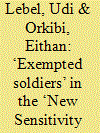

|
|
|
|
|
| Summary/Abstract |
In recent decades (the ‗post-heroic‘ condition) - threats of widespread selective conscientious objection have become a political tool to advance opposing political agendas in Israel. This article examines attitudes amongst the Israeli public concerning the legitimacy of demands that different groups of soldiers be exempted from military operations to which they are ideologically opposed (such as serving in the occupied territories or, conversely, participating in evacuation of settlements). The results point to a multi-cultural model embracing diversity management not as a neo-liberal ideal but rather as a strategy for co-option, containment and inclusion, with a view to preserving the “people's army” model.
|
|
|
|
|
|
|
|
|
|
|
|
|
|
|
|
| 2 |
ID:
165739


|
|
|
|
|
| Summary/Abstract |
This article deals with the manner in which family and community in Mandate Palestine attempted to keep the criminal justice system from intervening in cases defined as ‘Family Honour Killing’. Drawing on criminal court cases, we argue that the familial, domestic and communal features of this crime and its social, predominantly rural, context were critical for the attempts to keep it within the community and to prevent state intervention by obstructing, concealing and denying evidence. We focus on the mechanisms used by members of the family and community for that purpose. Our case study is in line with previous findings indicating the under-reporting of domestic violence, especially when witnesses were closely related to both the victim and the perpetrator. This domestic and communal alignment was most likely reinforced under colonial rule, though it was not necessarily caused predominantly in opposition to it.
|
|
|
|
|
|
|
|
|
|
|
|
|
|
|
|
| 3 |
ID:
165735


|
|
|
| 4 |
ID:
165737
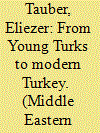

|
|
|
|
|
| Summary/Abstract |
Mustafa Kemal Atatürk, founder of modern Turkey, was one of the early leaders of the Young Turk movement. Nevertheless, when he founded modern Turkey as a nation-state he pushed the veterans of the Young Turks aside, as their pan-Turanian ideology no longer suited the basics of the new state. The leaders of the Young Turks represented the past and their perceptions no longer corresponded with the change of circumstances and the new objects of the nascent state. While Armenian activists assassinated some of the top leaders of the Young Turks as a revenge for the Armenian genocide, second-rank leaders had now to find their way in modern Turkey. Aziz Bey was one of the seniors of the Ottoman security system during the Young Turks period and eventually reached the most senior position of director of the Ottoman General Security Service. When modern Turkey emerged, because of his remarkable talents, he managed to fit in middle-level positions in the new state (province governor, mayor and MP), but never regained elite status.
|
|
|
|
|
|
|
|
|
|
|
|
|
|
|
|
| 5 |
ID:
165742
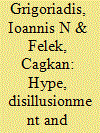

|
|
|
|
|
| Summary/Abstract |
Since the failed 2004 Annan Plan referendum, a special relationship between the Turkish Cypriot community and the EU institutions has been established. Increased unofficial contacts have paved the way for a reinforced role of sub-state actors, including Turkish Cypriot media. The role of the Turkish Cypriot media in shaping public opinion towards the EU has been largely correlated with the course of the Cyprus negotiations. Weak institutionalisation has negatively affected the influence of the local media on advancing the sui generis relationship between the Turkish Cypriot community and the European Union, as well as Europeanisation in the northern part of Cyprus. This article applies the theoretical framework of horizontal and vertical Europeanisation to explore the impact of local media on the relations between the European Union and the Turkish Cypriot community.
|
|
|
|
|
|
|
|
|
|
|
|
|
|
|
|
| 6 |
ID:
165738
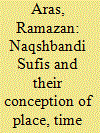

|
|
|
|
|
| Summary/Abstract |
The employment of diverse forms of security and control on territorial borders have led to the production of numerous events of border crossings, smuggling, banditry and death along with stories of separation, loss, mourning, pain, and yearning in the everyday life of border people. The Naqshbandi Khaznavi order has an expansive interpersonal social network across the political borders of Turkish and Syrian nation-states. This work analyzes the ways in which Sufis dealt with diverse aspects of the Turkish-Syrian border by unbinding shackles and orders of political system that were fabricated constantly from the 1920s to the early 1980s. The life stories and narratives of the Sufis document the existence of a religious-cultural landscape, diversifying the perception of place, time and fear which have transcended political borders for decades, contradicting official cartographic imagination and the modern-secular understanding of place and time. Besides, in addition to analyses of religious orders as social, economic and political entities, this work aims to elucidate emotional aspects of relations and faith that coexist between Sufis and their Sheikh in the context of spatial distance, political border and fear of death.
|
|
|
|
|
|
|
|
|
|
|
|
|
|
|
|
| 7 |
ID:
165740


|
|
|
|
|
| Summary/Abstract |
Analyzing the initiative to establish an Islamic–Arab–Palestinian pantheon in the holiest place in Jerusalem against the background of the Arab–Jewish conflict in Palestine, this article discusses the transformation of the Haram pantheon from an all-Islamic burial place to a Palestinian national one in which the Husayni family was given priority. Understanding decision-making regarding who was entitled to be buried in this special place is the main focus of the article. The eight personalities who were buried at the Haram signify different motivations according to the authority in charge of allowing the burial in the Haram, family ties and networks and the political needs of the Arabs of Palestine as well as the Hashemites.
|
|
|
|
|
|
|
|
|
|
|
|
|
|
|
|
| 8 |
ID:
165744
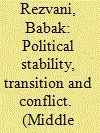

|
|
|
|
|
| Summary/Abstract |
Tajikistan and Georgia, in Central Asia and the South Caucasus respectively, are both small Soviet successor states with a recent history of political volatility and instability until the mid-2000s. Nevertheless, these independent countries have eventually developed diverging policies, notably with regard to their political alliances and world orientations. The Tajikistani Civil War resembles in many ways that of the Chechen conflict and also helps us understand the Syrian conflict. Similar to Georgia, Tajikistan had experienced the collapse of state institutions more intensely than other Soviet republics. Although contingent and actor-driven factors may have influenced the outcome, the influence of structural factors has been far greater than those agency-driven factors. This review article discusses, and tries to offer understanding and explanations for, political stability, transition and conflict in these two countries.
|
|
|
|
|
|
|
|
|
|
|
|
|
|
|
|
| 9 |
ID:
165736


|
|
|
|
|
| Summary/Abstract |
Between the nineteenth and twentieth centuries, the influence of Baron Julius de Reuter and his famous agency, Reuters, was evident in his and his family's investments around the world. By looking at the histories of the Reuter Concession and the Greek Railway Concession, this work aims to offer insight into the international politics of certain governments and the value of news as a commodity at the time. The Reuter Concession illustrates part of the British-Russian conflict over Persia while the Greek Railway Concession demonstrates British policy toward the Ottoman Empire and Greco-Ottoman relations.
|
|
|
|
|
|
|
|
|
|
|
|
|
|
|
|
| 10 |
ID:
165743
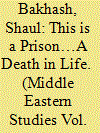

|
|
|
|
|
| Summary/Abstract |
Reza Shah, the feared and powerful master of Iran for nearly two decades, spent the last years of his life in lonely exile, on the island of Mauritius, then in South Africa. His life in exile was hardly a happy one. The place and conditions of his exile were dictated not by himself but by the British, and the relationship between the two remained uneasy. Britain’s handling of Reza Shah – the degree and freedom and choice they were prepared to allow him and his family – were determined by the exigencies of war. Reza Shah sought to loosen the bonds of British control. In Tehran, his son and successor, Mohammad Reza Shah, also played a role. He used what leverage he had with the British to help ease the conditions of his father’s exile, while he endeavored to protect Iran’s interests under a difficult foreign occupation. The push-and-pull of cross-purposes entailed by this triangular relationship defined Reza Shah’s life in exile in both Mauritius and Johannesburg. This article examines the Mauritian period of his exile.
|
|
|
|
|
|
|
|
|
|
|
|
|
|
|
|
|
|
|
|
|